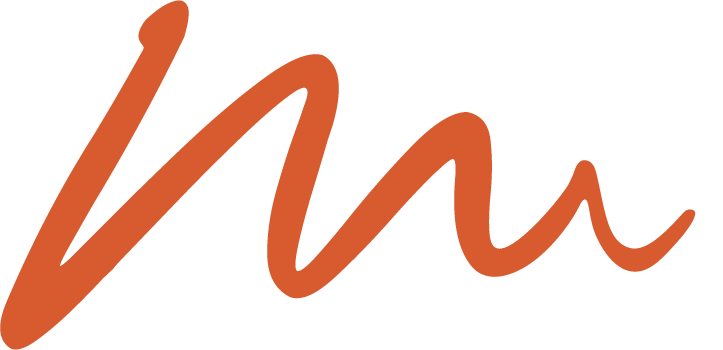Introducing the new DJI Matrice 400
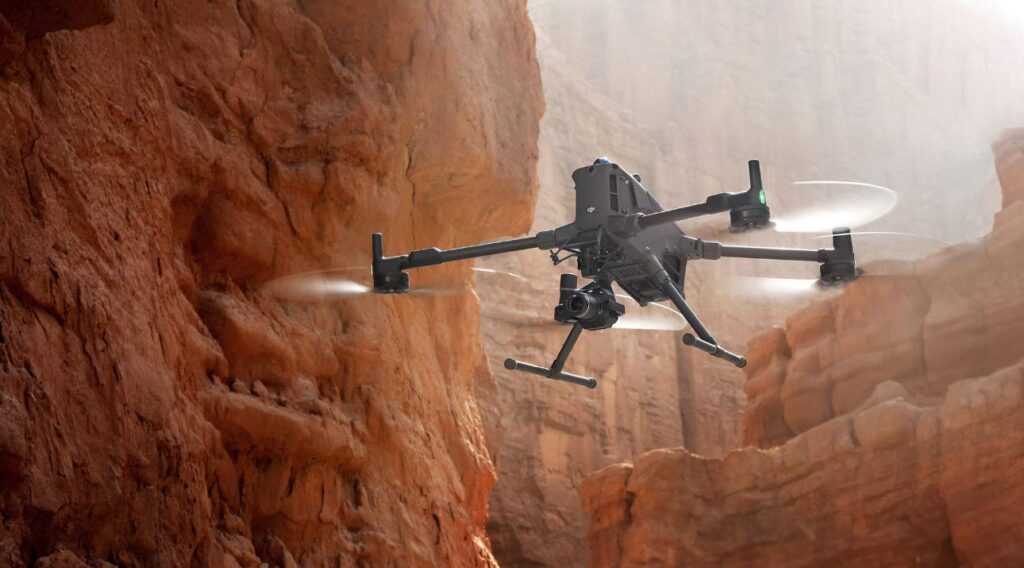
Hot on the scene, DJI has just unveiled the Matrice 400 – a brand-new enterprise drone designed for next-level performance in mission-critical operations. Building on the solid foundation of the Matrice 350 RTK, this latest release brings exciting upgrades in flight time, payload capacity, and intelligent features. From emergency response to advanced surveying, it’s set to make a serious impact across industries. Here’s what we know so far… Endurance and Connectivity You Can Count On With up to 59 minutes of flight time and 53 minutes of hovering, the Matrice 400 delivers the stamina needed for extended missions – whether you’re mapping wide areas, responding to emergencies, or covering complex terrain. That’s a noticeable boost from the already impressive airtime of the Matrice 350 RTK, giving teams even more flexibility in the field. It also reaches top speeds of 25 m/s and navigates confidently around buildings, ridgelines, and other obstacles, now with even more precise control. For long-range operations, DJI’s new O4 Enterprise Video Transmission System offers up to 40 km of stable signal – an upgrade from the O3 system on the 350 RTK – powered by an advanced ten-antenna array. Built-in support for the sub-2G frequency band and automatic network switching (via dual DJI Cellular Dongles) ensures smooth connectivity, even in high-interference urban zones or remote environments. Need even more range? With Airborne Relay Video Transmission – a feature not available on the 350 RTK – one Matrice 400 can act as a relay drone, maintaining seamless signal over vast distances. It’s an ideal solution for demanding missions like search and rescue or mountainous inspections where every second of connection matters. Adaptable Payloads for Every Mission Built with flexibility in mind, the Matrice 400 supports up to 6 kg of payload, with options to mount up to three devices simultaneously using dual gimbals, a third underside connector, and four E-Port V2 slots. While the Matrice 350 RTK offered solid payload versatility for most enterprise missions, the M400 takes it a step further – offering even more mounting points and integration options. It’s fully compatible with DJI’s Zenmuse H30 series, L2 LiDAR, P1, S1 Spotlight, V1 Loudspeaker, Manifold 3 – and even third-party payloads – making it highly customisable for any industry requirement. Smarter, More Capable Flights The Matrice 400 combines thermal and visual imaging, real-time obstacle detection, and precision flight automation to simplify complex operations. While the Matrice 350 RTK delivered dependable imaging and intelligent flight modes, the M400 introduces even more advanced capabilities – especially when paired with the Zenmuse H30 Series, allowing you to track people, vehicles, or vessels in real time. Add Zenmuse L2 and the drone becomes capable of automated power line inspections, actively sensing and avoiding obstacles mid-flight. Tools like DJI Pilot 2 and FlightHub 2 make it easy to plan advanced slope and geometric routes for building facades, bridges, or steep terrain. And for offshore work, it can take off from ships and land on moving decks using onboard pattern detection – pushing the boundaries of what was possible with the 350 RTK and extending operations well beyond land-based missions. Advanced Safety, Built In Ready for tough conditions, the Matrice 400 boasts an IP55 rating and operates in temperatures from -20°C to 50°C – matching the durability of the Matrice 350 RTK while pushing situational awareness even further. Its advanced Power-Line-Level Obstacle Sensing system – featuring rotating LiDAR, mmWave radar, and low-light fisheye sensors – detects even thin wires in fog, rain, or darkness. Aircraft Fusion Positioning enhances stability near structures like glass facades or wind turbine blades, while Full-Color Vision Assist improves pilot visibility in low-light environments. Whether flying in a city or along a mountain ridge, the Matrice 400 is designed to fly smart, and fly safe. Enhance Your Capabilities with DJI’s Supporting Tech The Matrice 400 is backed by a powerful range of accessories – each designed to enhance performance, connectivity, and mission flexibility, whether you’re flying in the city, at sea, or off-grid. DJI RC Plus 2Built for tough environments, this weather-resistant remote controller features a bright, sunlight-readable screen, IP54 protection, and O4 Enhanced Transmission. With support for 4G hybrid connectivity, it ensures smooth, stable video streams – even in complex or remote locations. DJI Cellular Dongle 2Working alongside the O4 system, this 4G dongle provides reliable video transmission and network access, helping maintain strong connections in high-interference or low-signal areas. TB100 & TB100C BatteriesThe TB100 delivers up to 400 charge cycles, with built-in self-heating and efficient cooling for dependable all-weather performance. The TB100C tethered version enables long-duration aerial operations and is ready for integration with third-party drone docks and recharging systems. BS100 Battery StationA streamlined, all-in-one charging solution that handles up to three TB100s and two WB37s. With fast 45-minute charging and a low-noise Silent Mode, it’s ideal for keeping your fleet powered and ready without disruption. D-RTK 3 Multifunctional StationFor teams needing precise positioning, this advanced base station supports multiple drones simultaneously. The new Rover Mode, combined with DJI Terra and the Enterprise app, brings survey-grade accuracy to your aerial mapping missions. Sounds Good? Whether you’re already flying the dependable Matrice 350 RTK or exploring options for your next enterprise upgrade, the Matrice 400 introduces a new level of capability worth considering. With its extended flight time, enhanced obstacle sensing, expanded payload flexibility, and next-gen transmission systems, it’s built to meet the demands of the most complex missions. It doesn’t replace the 350 RTK’s strengths – it builds on them, offering a future-ready platform for teams who need more range, more intelligence, and more confidence in every flight. While official pricing is yet to be confirmed, we’re optimistic it will remain competitive with the Matrice 350 RTK. Current lead time is approximately 8–12 weeks, so if you’re considering an upgrade, now is the perfect time to start planning. Interested in taking your operations to the next level? Our team of experts is ready to guide you through the possibilities – register your interest today and let’s explore
Introducing the Autel Evo Lite Enterprise
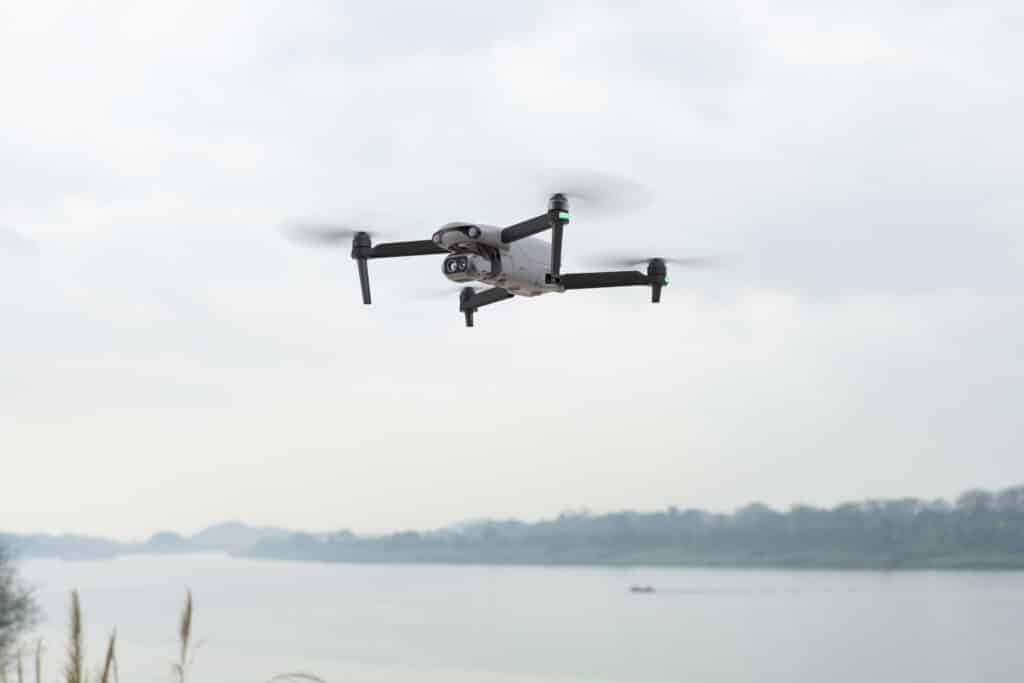
For professionals seeking a compact and capable drone for commercial operations, the Autel Evo Lite Enterprise offers a great balance of performance, portability, and ease of use. It stands alongside alternatives like the DJI Mavic 3 T in terms of flight performance and imaging capabilities, while coming in at a significantly more accessible price point. The Mavic 3 T, once a go-to option in this category, has been rumoured to be discontinued – prompting some users to consider longer-term alternatives that offer similar capabilities without depending on a model that is potentially due to be phased out. Although each model has its own strengths, the Autel Evo Lite Enterprise is a great option for teams looking to achieve professional results without the higher investment often associated with other systems. Deployment, Flight Planning & Software Integration The Autel Evo Lite Enterprise drone is designed with efficiency in mind, featuring a foldable frame that makes transport and setup straightforward – ideal for teams working in dynamic or time-sensitive environments. It offers quick deployment with minimal effort, making it a practical option for field-based operations. When it comes to flight planning and post-processing software, the Evo Lite Enterprise stands out as a highly capable and flexible option. Its compatibility with multiple software environments, combined with its more accessible price point, makes it an attractive choice for teams looking to balance performance with overall value. That said, the platform does come with a learning curve for those unfamiliar with Autel’s ecosystem, and some users may find the interface less intuitive at first. However, once mastered, it proves to be a capable and straightforward tool in the field. The Autel Evo Lite Enterprise also features the A-Mesh system, allowing one pilot to fly multiple drones at once. These drones form a smart, self-organising network – ideal for fast, coordinated missions such as search and rescue. With the “Lead Controller” setup, the pilot can switch between managing all drones, the Lead drone, or individual Member drones. This enables dual-drone control and mutual obstacle avoidance, improving both safety and efficiency. Lightweight Design with Practical Performance The Evo Lite Enterprise strikes a solid balance between portability and capability, making it a versatile tool for professionals working across a variety of environments. Weighing under 900 grams, it’s one of the lightest enterprise drones in its class. This makes it especially appealing for those who need to travel light without compromising on performance. With up to 40 minutes of flight time and a 12 km video transmission range, it comfortably supports extended missions – placing it alongside other advanced drones like the Mavic 3 T in terms of endurance and reach. However, what sets the Evo Lite Enterprise apart is how much it delivers in such a compact and cost-effective package, making it a great option for those prioritising both mobility and value. Three-directional obstacle sensors (front, rear, and underside) provide added safety during flights, particularly in complex or confined areas. While obstacle avoidance is now common in this category, the Evo Lite’s use of these features within such a lightweight frame remains unique. Clear Imaging for Confident Decision-Making The Evo Lite Enterprise offers two camera options: a dual gimbal with thermal and visible imaging on the 640T model, and a high-resolution 6K camera on the 6K variant – both suited for inspections, search and rescue, and low-light operations. Reliable video transmission up to 12 km and automatic frequency switching ensure a stable connection, even in challenging environments. Precision Control for Real-World Missions The Evo Lite Enterprise is equipped with advanced GPS and IMU systems that enable stable, responsive flight – even in unpredictable weather or complex environments. Its intelligent flight controls include real-time telemetry and automated tracking, helping pilots maintain awareness and precision throughout each mission. These capabilities are on par with those found in DJI’s enterprise drones, offering similar levels of control and situational awareness. What sets the Evo Lite apart is its flexibility when it comes to payloads. Operators can easily customise the drone with tools like spotlights for low-light inspections, loudspeakers for public safety announcements, or strobe lights for increased visibility during coordination with ground teams. This modular approach allows the Evo Lite Enterprise to adapt to a wide range of scenarios, from infrastructure checks and emergency response to night-time patrols – making it a practical choice across multiple industries. In summary, the Autel Evo Lite Enterprise is a strong alternative to DJI’s compact enterprise drones, particularly for professionals who prioritise portability, imaging quality, and value for money. It’s especially well-suited to teams working in inspection, public safety, search and rescue, and field operations where fast deployment and reliable visuals are key. Unlike many DJI models, the Evo Lite is not restricted by built-in geofencing, which can be a valuable advantage in regions where operational flexibility is essential. For operators seeking a lightweight, high-performance drone without the constraints or higher costs of other platforms, the Evo Lite Enterprise remains a compelling choice. If you’d like help choosing the right drone or have questions about enterprise operations, reach out today! Our expert team is here to guide you. Related Blogs
How to Plan a Drone Mission: (Part 2) Key Stages of a Drone Mission
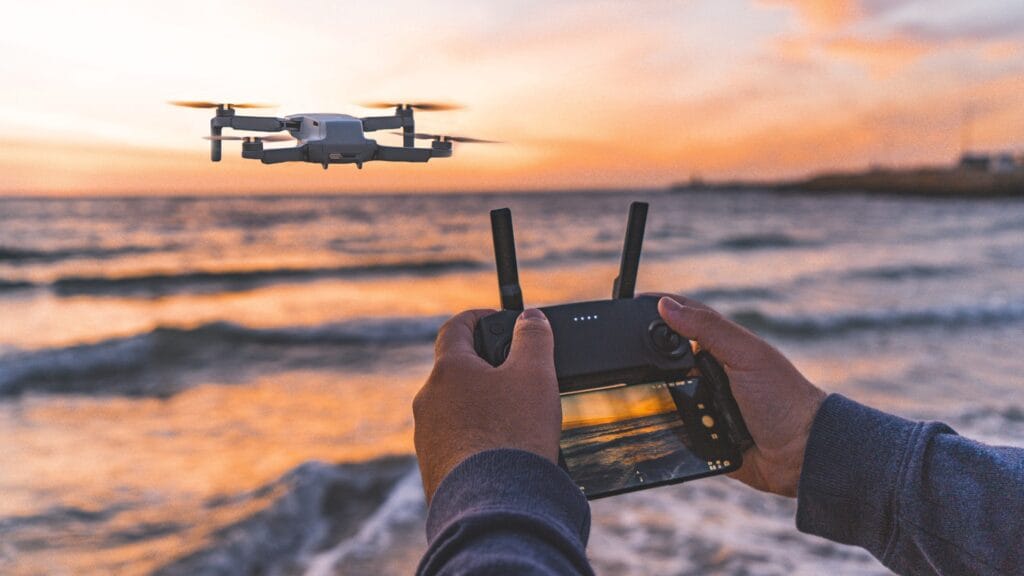
Planning and executing a drone mission involves several crucial steps to ensure success and compliance. Below, we outline the essential stages of a drone mission, from preparation to post-flight reporting. Drone Check: Preparation and Equipment Before anything else, ensure that you have all necessary equipment ready. This includes the drone, fully charged batteries, controllers, and any additional sensors or tools required for the mission. https://youtu.be/rzstbhpOAuI?si=bePxtLiYc_-m1J4L Weather Check Weather conditions play a significant role in the planning and execution of a drone flight. Check the forecast to anticipate wind, rain, or other weather conditions that could impact the flight path and safety. Mission Planning Carefully plan the drone’s flight path, considering the objectives and the area’s geography (and weather of course). This step is crucial for maximizing efficiency and gathering the needed data effectively. Permissions and Regulatory Compliance Verify that you have all required permissions and that your mission complies with local drone regulations. This includes ensuring that the flight area is not restricted and that you have the necessary approvals for commercial drone activities. Pre-Flight Checks Conduct thorough pre-flight checks to ensure the drone is in perfect working order. This includes checking the drone’s hardware, software, and communications systems to prevent any issues during the flight. Execution: Flying the Drone Execute the flight plan, controlling the drone within the established parameters and adjusting as needed based on real-time observations and conditions. Reserve and Contingency Planning Always have a backup plan, which may include having spare parts, extra batteries, or even a backup drone. This ensures you can complete the mission even if unexpected problems arise. Debrief and Reporting After the flight, conduct a debrief to review how the mission went and any issues encountered. Depending on the mission type, deliverables might include detailed reports, surveys, photographs, or 3D models. Ensure these are prepared and delivered according to the client or project requirements. Mission Complete! Each of these stages is designed to optimize the success and safety of your drone operations. By methodically preparing and following through each phase, you can ensure that your drone missions are effective, compliant, and safe. Whether you’re capturing stunning aerial photography or conducting critical infrastructure inspections, attention to these details will provide the best outcomes and enhance your operational capabilities. For further guidance or to discuss the specifics of your upcoming drone mission, don’t hesitate to reach out. Our team is ready to support you with expert advice and guidance on what drone to use for your mission. Related Blogs
What to Consider When Buying an Enterprise Drone in the UAE

Enterprise drones are becoming an essential tool across a wide range of industries. Whether it’s inspections, mapping, monitoring or data collection, their role in business operations is growing – and with that comes a need for clear, reliable guidance on how to choose the right one. If you’re thinking about bringing a drone into your workflow, this guide will help walk you through a few key points to keep in mind, especially when it comes to buying and operating drones here in the UAE. Identify The Correct Drone For Your Requirements Finding the right drone starts with understanding what your business really needs – and that’s not always straightforward. Some companies know exactly what they’re looking for, while others are still exploring their options. Either way, working with a knowledgeable reseller makes all the difference. Discussing the reason that you need a commercial drone and the results you are looking for, will help when getting advice on which drone to buy. Find a Drone Supplier You Can Rely On From comparing enterprise models to understanding technical requirements and capabilities, having the right support can help you make a more confident decision. That’s why it’s worth choosing a drone supplier who offers genuine aftercare and ongoing support – not just a transaction. We have a team of dedicated experts on hand to help guide your decision, ensuring the drone you choose is the right fit for your business both now and further down the line. Understanding Eligibility For Enterprise Drone Purchases In the UAE, enterprise drones are classified as regulated equipment, which means they can only be sold to registered companies with a valid trade license. This is to ensure the proper permissions are in place before any drone ownership is transferred or products shipped. The process typically involves obtaining a No Objection Certificate (NOC) from Dubai Civil Aviation, as well as approval from SIRA – the Security Industry Regulatory Agency. These approvals are necessary to authorise the sale. For companies based outside the UAE, SIRA also provides the export permit required for international delivery. Without these permissions, the sale cannot be completed legally. Important Steps To Be Aware Of Before an enterprise drone can be registered and used legally, there are a few important steps to be aware of – especially here in the UAE: -Letter of Confirmation (LOC): The company purchasing the drone will need to get an LOC from the Ministry of Industry and Advanced Technology (MOIAT). This document allows the drone to be registered under the company’s name. -Trade License & Aviation Registrations: If you intend to fly the drone within the UAE, it’s important to make sure your trade license includes the correct activities for operating drones. You’ll also need to be registered with both the Dubai Civil Aviation Authority (DCAA) and the General Civil Aviation Authority (GCAA) to apply for the permits required to fly legally. -Even if the drone is available and in stock, approvals can take a little time. SIRA (the Security Industry Regulatory Agency) usually takes around 7–10 working days to approve a sale within the UAE. For international orders, the timeline is typically 2–3 weeks, depending on the country and its regulations, however this can vary. You will need to factor in this time when making a purchase. (If you’re based outside the UAE, it’s best to check with your local civil aviation authority to understand what’s required in your region.) Understanding the steps involved in purchasing an enterprise drone – whether it’s choosing the right model, identifying a trusted reseller, or navigating local regulations – can make a big difference in how smooth the process is. While there are a few important requirements to keep in mind, the right guidance can make it much more manageable! If you support or have any questions along the way, we’re here to help you make informed decisions and move forward with confidence. Contact our friendly team today! Related Blogs
Mavic 3 Enterprise vs Matrice 4 Series
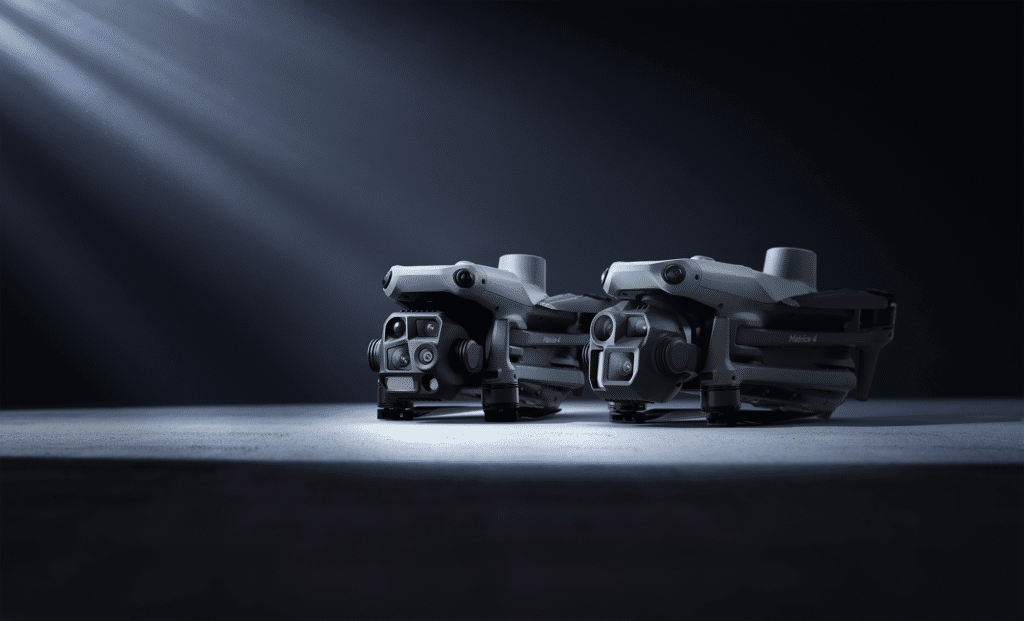
When it comes to choosing the best commercial drone for your needs, DJI offers two standout options: the Mavic 3 Enterprise and the new Matrice 4 series. Both drones excel in their respective fields, but they cater to different requirements. Let’s compare them and help you decide which is the right fit for your operations… A Closer Look… The Mavic 3 Enterprise Series stands out for its compact size and portability, making it perfect for quick take-offs and fast-paced work. Its lightweight design ensures easy transportation and supports an optional RTK module to enhance its detailed mapping and surveying tasks – making the Mavic 3E a well-rounded and user-friendly option for both beginners and seasoned pilots alike. In comparison, the Matrice 4 Series is built to tackle more challenging and intricate tasks. While it may not be quite as portable as the Mavic 3, it offers a diverse range of advanced features such as its integrated DJI RTK modules with GNSS and Vision Fusion Positioning to provide high accuracy, making it the ideal choice for more complex operations that require extra capabilities. Performance & Flight Time The Mavic 3 Enterprise offers an impressive 45-minute flight time, making it perfect for long operations. Its compact, foldable design ensures easy portability for professionals on the go. Featuring a 4/3 CMOS 20MP wide-angle camera with a mechanical shutter, it captures fast, blur-free shots for smooth and efficient mapping. Plus, the 12MP telephoto camera with up to 56× hybrid zoom lets you capture detailed images from a distance. The Matrice 4 series offers around 40 minutes of flight time and excels when it comes to carrying heavier, specialised payloads thanks to its robust build – making it perfect for demanding tasks like surveying and industrial inspections. With a 4/3-inch 20MP wide-angle and two 48MP telephoto cameras (1/1.5 inch & 1/1.3 inch), it’s been expertly built to handle complex surveys and detailed inspections with ease. *Keep in mind that the payloads for the Mavic 3 Enterprise Series & the Matrice 4 Series are not interchangeable. This is something to consider if you’re looking to use existing payloads across both drone models! Thermal Imaging For tasks that require thermal imaging, the Mavic 3T offers a 640 × 512-pixel thermal camera. It’s equipped with features like point and area temperature measurement, high-temperature alerts, and color palettes, making it an excellent choice for quickly assessing critical situations. The Matrice 4T on the other hand, takes thermal imaging to the next level. It combines a 48MP wide-angle camera, two telephoto cameras, a thermal camera, and a laser rangefinder, all working seamlessly to provide accurate, detailed data. This powerful setup is perfect for advanced thermal and night operations, providing the precision and depth you require for complex missions. Our Conclusion… When deciding between the Matrice 4 Series and the Mavic 3 Enterprise, it really comes down to what you’re looking for. If you’re handling more intricate tasks that require top-tier imaging, precision, and versatility, the Matrice 4 Series is your go-to. It’s packed with advanced features and built for those complex, high-end operations. On the flip side, if portability and ease of use are more your style, the Mavic 3 Enterprise strikes a perfect balance. It’s great for quick deployments and standard tasks like inspections, making it an excellent choice for those who need something reliable and efficient on the go. If you’re unsure which one fits your needs best, don’t worry, our team at Drone Shop is here to guide you! We offer expert advice to help you make the most of your commercial drone investment. Thanks for reading, and feel free to explore our related articles below if you want to dive deeper into drone insights! Related Blogs
How Drone Software Enhances Operational Efficiency
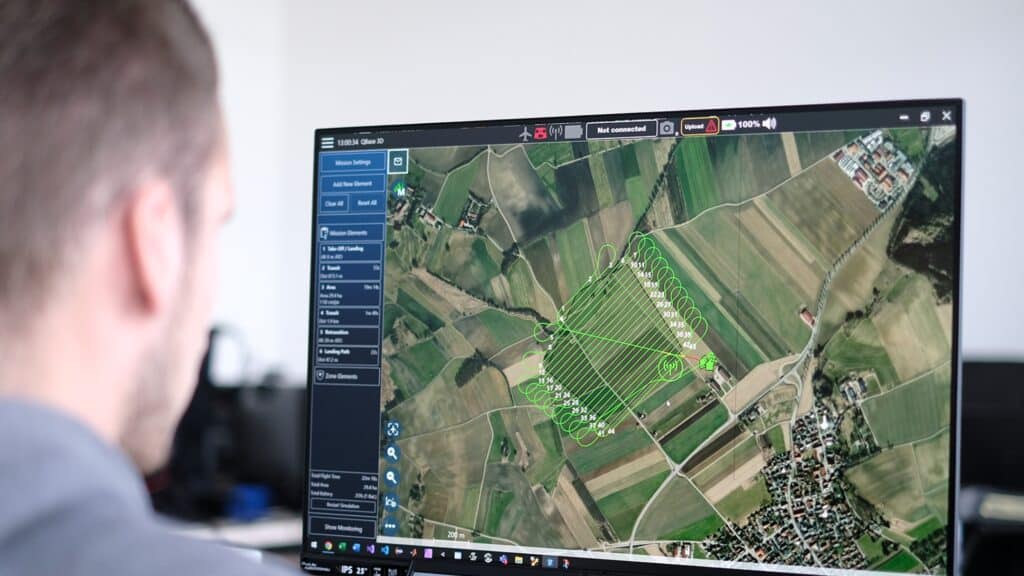
In this blog, we’ll look at the different types of software that make drones more useful. Whether it’s for drawing maps, planning flights, or analysing photos, these programs help get the most out of every flight. Mapping Software Facilitates the creation of detailed maps and 3D models from aerial images, crucial for sectors like agriculture, construction, and real estate. This software is fundamental in transforming high-resolution aerial images into detailed topographic maps and 3D models. It is invaluable in industries requiring precise geographical data, such as agriculture, construction, and urban planning. By streamlining data collection, mapping software reduces the need for extensive manual surveys, saving time and resources. Analytics Tools Processes data from drone flights to provide actionable insights, vital for optimizing operations in fields such as agriculture for crop health monitoring or infrastructure for progress tracking. Utilizing these tools, drone operators can harness complex data for practical applications, streamlining workflows and boosting the accuracy of outcomes. This level of analysis is indispensable for sectors that rely heavily on precise and timely data, from environmental monitoring to urban planning. Flight Planning Tools Enables precise route planning based on factors like terrain, weather, and regulatory restrictions, ensuring efficient and safe flights. Critical for operational planning, flight planning software ensures that drones operate within safe and legal parameters. It helps operators plan flights that maximize battery efficiency and coverage area while adhering to no-fly zones and weather conditions. This not only helps in avoiding potential hazards but also ensures compliance with aviation regulations. Most drones come with their own specific software, but there are third party software’s out there that can be used as well for different projects. 3D Modelling Tools Enhances the ability to create complex, detailed three-dimensional representations of captured data, ideal for industries requiring precision modelling like architecture and urban planning. 3D modelling software provides a deeper level of detail in visualizations, allowing professionals to create precise models of physical spaces. This capability is particularly useful in construction, architecture, and heritage preservation, where accurate 3D representations are essential for planning and documentation. Notable software brands in these categories include Bentley, Pix4D, and AgiSoft, which are well-recognized within the industry for their capabilities in processing and modelling complex data sets. Each type of software plays a pivotal role in maximizing the effectiveness and safety of drone operations. We hope you found this article useful, for personalized advice on integrating drone software into your operations, or for recommendations on the best tools for your specific needs, our experts are ready to assist. Contact us today to streamline your drone operations and enhance your operational capabilities. Related Blogs
What Are Fixed-Wing Drones & When Should You Use Them?
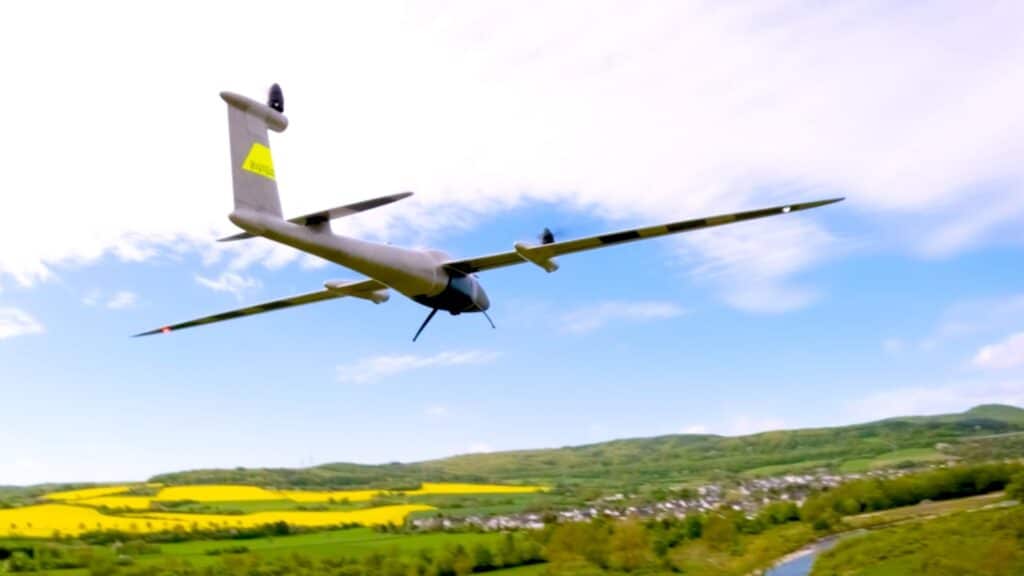
Fixed-wing drones, often recognized for their airplane-like design, stand out for their efficiency and capability in large operations. Unlike their multi-rotor counterparts, fixed-wing drones rely on the movement of air over their wings to provide lift, similar to traditional aircraft. This design gives them several advantages, particularly in large-scale and time-sensitive projects. Advantages of Fixed-Wing Drones: Accessibility: VTOL technology allows these drones to operate in varied and constrained environments where traditional fixed-wing drones could not. Efficiency: They combine the quick deployment and landing capabilities of multi-rotors with the long-range, high-speed flight of fixed wings, making them highly efficient. Versatility: Ideal for complex missions, including geographic mapping of rugged terrain and agricultural surveys over vast areas. Longer Flight Times: Fixed-wing drones are particularly beneficial for large-scale projects due to their longer flight times and ability to cover vast distances without the need to recharge. This capability means they can complete missions in a shorter period compared to other drone types, reducing labour and the need for multiple flights. Understanding VTOL One significant innovation in fixed-wing drones is VTOL (Vertical Take-Off and Landing) This technology combines the best of fixed-wing and rotor-based drone capabilities. VTOL allows fixed-wing drones to take off and land on the spot, much like a helicopter, eliminating the need for a runway. After ascending, they transition to horizontal flight, benefiting from the energy efficiency and speed of fixed-wing aerodynamics. Autonomy and Operation Fixed wing drones are often fully autonomous, capable of executing pre-planned missions with minimal human intervention. From take-off to data collection, and landing, every step can be automated, ensuring precision and consistency in data collection, which is crucial for scientific surveys, environmental monitoring, and large infrastructure projects. Sensor Technology Fixed-wing drones can also be equipped with a range of sensors to boost their capabilities: RGB Sensors: Similar to consumer cameras, these sensors capture images in red, green, and blue light. They are necessary for general photography and videography and play a key role in surveying and mapping by capturing detailed images of landscapes. LiDAR Sensors: LiDAR (Light Detection and Ranging) utilizes laser beams to measure distances to the Earth’s surface. These sensors are essential for producing precise three-dimensional maps and collecting accurate geographical data. Thermal Sensors: By detecting heat emitted from objects, thermal sensors are essential in locating people or animals in search and rescue missions, monitoring wildlife, and inspecting buildings to identify heat loss or potential issues. Multispectral Sensors: Primarily used in agriculture, these sensors gather data across multiple light bands to analyse plant health. This helps farmers optimize crop yields and minimize waste by monitoring light absorption and reflection. For more info on sensors, check out our article “Advanced Sensor Technology in Drones”, available here. Saving Time and Money Incorporating fixed-wing drones into commercial operations translates into significant savings in time and money. These drones are designed to handle extensive tasks efficiently, offering a return on investment that is attractive to industries spanning from agriculture to urban planning. Their ability to quickly gather data across large areas reduces the number of flights needed, thereby decreasing operational costs, and speeding up the time to insight. To see an example of a fixed wing drone and to learn more about what they can offer, check out the Quantum Systems Trinity Pro on our website. Fixed-wing drones, particularly those equipped with VTOL, are greatly improving how large-scale projects are managed and executed. By reducing both time and financial investments, these drones offer a powerful tool for businesses looking to boost efficiency and productivity. If you are exploring the potential of drones to advance your operations, our team at Drone Shop is here to assist. With our expertise, we can help you weigh up your options and find the most effective solution for your needs. Related Blogs
Drone Range and Battery Life Explained: How Far and Long Can You Fly?
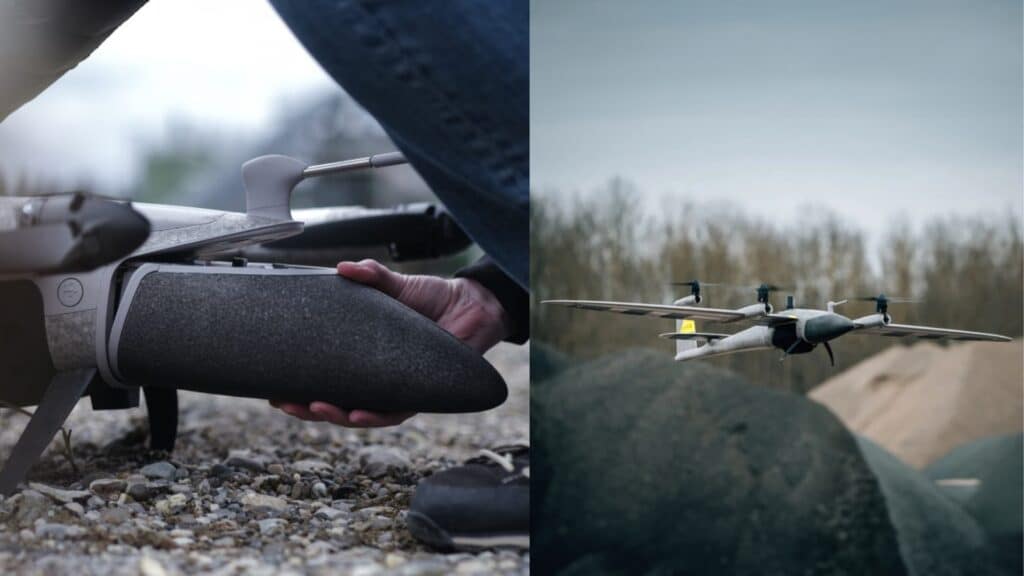
Understanding the factors that impact drone range and battery life is crucial for making the output of your operations more efficient. Drone range refers to how far a drone can fly before it must return, while battery life determines how long it can stay in the air. Factors Affecting Range and Flight Time: Battery Capacity: Larger batteries provide longer flight times but may increase the drone’s weight. Weight: The heavier the drone, especially with added payloads, the more battery power it requires. Weather Conditions: Wind and temperature can significantly affect battery performance and has a big impact on flight range and duration. Flying Techniques: Efficient use of battery life also depends on the pilot’s ability to manage the drone’s speed and manoeuvring. Tips to Increase Drone Performance: Optimize Payloads: Use only necessary equipment to keep the drone’s weight optimal. Monitor Weather Conditions in Advance: Plan flights for optimal weather conditions to avoid high winds, rain, or extreme temperatures. Regular Maintenance: Keep your drone in good health with regular checks on battery health and propeller condition. Preventing Battery Over-Discharge and Extending Life Effective battery management is key to extending the life of your drone’s battery: Optimal Charge Levels for Storage: Discharge the battery to about 40%-65% if not in use for more than 10 days. Store in a cool, dry place at a recommended temperature between 22°C and 28°C. Routine Cycling: Fully charge and discharge the battery at least every three months to maintain capacity and performance. After charging, use the drone until it reaches about 65% capacity before storage. Storage and Maintenance: Store batteries in a well-ventilated area and recharge them if they fully deplete and enter hibernation to prevent permanent damage. Understanding Restrictions and Extending Flight Capabilities: In many regions, drone flight is restricted by regulations that may limit where and how long you can fly. However, it is possible to apply for permissions to extend these capabilities on a case-by-case basis. For instance, to increase the Trinity Pro’s flight time from 60 to 90 minutes, a detailed application must be submitted to the manufacturer, who will coordinate with the relevant authorities. This process can be time-consuming and is not guaranteed to result in approval. The laws in the UAE are subject to change and we do our best to keep our blog updated with the latest revisions to legislation, for more information and to stay up to date you can check out this article around UAE laws and regulations. If you require assistance with navigating these regulations or applying for extended flight capabilities, our expert team at Drone Shop is ready to help. Feel free to contact us to help ensure your drone missions are as efficient and compliant as possible. Related Blogs
How to Plan a Drone Mission: (Part 1) Pre-Flight Tips for Success

Welcome to the first installment in our two part series on “How To Plan a Drone Mission”, in this first article we will take you through a basic step by step guide on how to plan your mission successfully and safely. Make sure you stay up to date on our blog and follow us on our socials for updates on part two, where we will showcase these steps in a live drone mission with the Trinity Pro. Not to be missed! Planning a drone mission is a critical step that ensures the success and safety of your operations, especially for professional drone operators and commercial pilots. To navigate your next flight seamlessly, here are essential pre-flight tips that will prepare you for any aerial challenge. Understand Your Mission Objectives Before any flight, clearly define what you need to achieve. Whether it’s surveying, inspection, or aerial photography, having clear objectives helps you plan the flight path and choose the right equipment and settings. Check the Weather Weather can significantly impact drone performance. Always check the forecast for wind, rain, and temperature for the planned time of your flight. High winds can destabilize your drone, while rainfall can damage its electronic components. Review Local Flight Regulations The UAE has specific regulations concerning drone flights. Make sure you are up to date with the local laws to avoid legal issues. This includes no-fly zones, altitude restrictions, and any special permits and permissions required for the area. Select Appropriate Mapping Software Choose a mapping software that fits the mission’s needs. For detailed surveys, software with advanced analytical tools and high-resolution output is essential. Seek help from a professional and/or familiarise yourself with the software beforehand to ensure it runs smoothly during the mission. Run Through a Pre-Flight Checklist Always run through a pre-flight checklist before take-off. Check the drone’s battery levels, propeller condition, camera settings, and GPS functionality. This will help identify any issues that might interfere with the mission. Plan for Emergencies Have a contingency plan ready in case of unexpected events such as sudden weather changes or technical failures. Know where you can safely land and ensure your drone’s return-to-home feature is correctly set up. Conduct a Site Survey If possible, visit the site beforehand or use satellite imagery to understand the terrain and identify potential obstacles. This will help in planning a safe and efficient flight path. With these pre-flight preparations to hand, you’re now well on your way to conduct a successful drone mission. By carefully planning each step, you not only increase the safety of your operation but also the quality of the data collected. If you’re looking for expert guidance or need assistance with obtaining the necessary permits and licenses for your drone operations, our team at Drone Shop is here to help. Contact us today to ensure your next drone mission is a success! Related Blogs
How to Get Certified as a Commercial Drone Pilot

Becoming a certified commercial drone pilot is an essential step for anyone looking to use drones for business purposes. The certification process ensures you understand the safety protocols, legal requirements, and operational standards necessary to fly drones commercially. Here is a simplified guide on how to obtain the necessary certifications, register your drone, and understand the implications of non-compliance. Understand the Certification Requirements Start by familiarising yourself with the certification requirements relevant to your operation. This typically involves passing a knowledge test that covers local laws, operation procedures, navigation, and drone specifics. The exact details can vary, so it is crucial to consult your local aviation authority’s website for the most accurate information. If you are based in the UAE, for Dubai this is the DCAA, for other Emirates you can contact the GCAA. Choose a Training Program Enrol in an accredited GCAA or DCAA drone pilot training program. These courses are crafted to prepare you for the official certification exam and often offer practical flight training, which can be invaluable. (This is something we can assist with at Drone Shop, for more information on this, visit this link) Pass the Certification Exam After completing your training, you will need to pass a certification exam. This test will typically be administered by the national aviation authority or an approved testing centre. Passing this exam demonstrates your competence in both the theoretical and practical aspects of drone operation. Register Your Drone Once certified, the next step is to register your drone with the relevant authorities. This registration typically requires providing details about your drone, including the make, model, serial number, and proof of insurance. Registration is crucial as it helps in the accountability and management of drones in national airspace. Understand the Consequences of Non-Compliance Operating a drone without proper certification or failing to register your drone can lead to significant penalties, including fines and legal action. It is also likely to restrict your opportunities for commercial drone use in the future. Stay Updated Drone regulations are continuously evolving as the technology, and its applications develop. It is important to stay informed about any changes to the laws that might affect your operations. By following these steps, you can ensure that you meet all legal requirements and are fully prepared to commence commercial drone operations. Keep in mind that drone regulations are subject to change, so it is wise to stay connected with experts who can provide guidance and updates. If you need assistance or have any questions about getting certified or registering your drone, our team at Drone Shop is here to help. Keep an eye on our blog for the latest industry updates, make sure you follow us on LinkedIn and Instagram, and feel free to reach out to us for advice if you want to make sure you are up to date and flying safely and legally. Related Blogs

